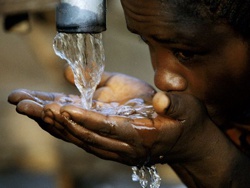- Home - News
- TWI News | TV
- Polls
- Year In Review
- News Archive
- Crime & Punishment
- Politics
- Regional
- Editorial
- Health
- Ghanaians Abroad
- Tabloid
- Africa
- Religion
- Election 2020
- Coronavirus
- News Videos | TV
- Photo Archives
- News Headlines
- Press Release
Regional News of Thursday, 19 December 2013
Source: Nhyira Fm
Drobonso residents share streams with animals

There is a growing rate of water-borne diseases among residents of Drobonso, capital of the Sekyere Afram Plains District of the Ashanti Region despite the availability of potable drinking water.
Residents of the newly-created district have been complaining that water from boreholes in the community is salty, compelling them to share water from streams with cattle.
Sekyere Afram Plains is a major food basket of the Ashanti Region.
However, the predominantly farming communities in the area lack health facilities, schools, good roads, water and electricity.
The about 4000 people at Fumsua, Dawia, Abenoa, Issakrom and other communities in the District have to travel about 50 kilometers to get water from rivers like Afram, Drobon and Abrefa for drinking and other purposes.
Bilharzia, buruli ulcer and diarrhoea are common, especially among children in the district.
Despite the danger posed by the use of unwholesome water from streams, residents of Drobonso prefer it to what they say is salty water from boreholes.
Assembly member for the area, Thomas Adu, sounds helpless when he spoke to Nhyira News about the situation.
“The herdsmen allow their cattle to drink water and they defecate into the rivers as well. And based on that when we drink water from the streams we have stomachache, bilharzia and other related diseases”.
For years, residents there have been relying on a small clinic at the district capital, Drobonso, for the treatment of malaria and other ailments. At times, with support from the District Health Directorate at Kumawu, victims are sent for treatment at the Agogo Presbyterian Hospital, about 60 kilometers away.
Even though there is no data to back it, health officials admit that water-related infections are prevalent in the area.
District Health Director, Elizabeth Sarfo, tells Nhyira News the directorate faces a herculean task in using public education to deal with the challenge.
“It is true that we have Buruli Ulcer cases here and we have linked with the Presbyterian Hospital at Agogo where we have sensitized the people in the initial development of the disease. We educate them that when they fetch water from the stream, they should boil, cool it before drinking,” Ms Sarfro said.
Sekyere Afram Plains District Chief Executive, Fuseini Donkor, appeals to the Ministry of Water Resources, Works and Housing to extend the Kumawu Water Project to the area to augment the existing bore holes in the assembly.










